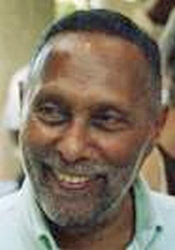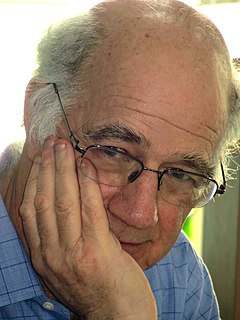Related Research Articles

Stuart McPhail Hall was a Jamaican-born British Marxist sociologist, cultural theorist and political activist. Hall, along with Richard Hoggart and Raymond Williams, was one of the founding figures of the school of thought that is now known as British Cultural Studies or The Birmingham School of Cultural Studies.

Anthony James Gregor was a Professor of Political Science Emeritus at the University of California, Berkeley, well known for his research on fascism, Marxism, and national security.

Sociology as a scholarly discipline emerged primarily out of the Enlightenment thought, shortly after the French Revolution, as a positivist science of society. Its genesis owed to various key movements in the philosophy of science and the philosophy of knowledge. Social analysis in a broader sense, however, has origins in the common stock of philosophy and necessarily pre-dates the field. Modern academic sociology arose as a reaction to modernity, capitalism, urbanization, rationalization, secularization, colonization and imperialism. Late-19th-century sociology demonstrated a particularly strong interest in the emergence of the modern nation state; its constituent institutions, its units of socialization, and its means of surveillance. An emphasis on the concept of modernity, rather than the Enlightenment, often distinguishes sociological discourse from that of classical political philosophy.
The Centre for Contemporary Cultural Studies (CCCS) was a research centre at the University of Birmingham, England. It was founded in 1964 by Richard Hoggart, its first director. From 1964 to 2002, the Centre played a "critical" role in developing the field of cultural studies.

Marxism is a method of socioeconomic analysis that views class relations and social conflict using a materialist interpretation of historical development and takes a dialectical view of social transformation. It originates from the works of 19th-century German philosophers Karl Marx and Friedrich Engels.
Cultural pluralism is a term used when smaller groups within a larger society maintain their unique cultural identities, and their values and practices are accepted by the wider dominant culture provided they are consistent with the laws and values of the wider society. As a sociological term, the definition and description of cultural pluralism has evolved over time. It has been described as not only a fact but a societal goal.
The unity of science is a thesis in philosophy of science that says that all the sciences form a unified whole.

Robert Neelly Bellah (1927–2013) was an American sociologist and the Elliott Professor of Sociology at the University of California, Berkeley. He was internationally known for his work related to the sociology of religion.
Paul Quentin Hirst was a British sociologist and political theorist. He became Professor of Social Theory at Birkbeck, University of London in 1985 and held the post until his death from a stroke and brain haemorrhage.
Terrell Foster Carver is a Professor of Political Theory at the University of Bristol.
Randall Collins is an American sociologist who has been influential in both his teaching and writing. He has taught in many notable universities around the world and his academic works have been translated into various languages. Collins is currently the Dorothy Swaine Thomas Professor of Sociology, Emeritus at the University of Pennsylvania. He is a leading contemporary social theorist whose areas of expertise include the macro-historical sociology of political and economic change; micro-sociology, including face-to-face interaction; and the sociology of intellectuals and social conflict. Collins's publications include The Sociology of Philosophies: A Global Theory of Intellectual Change (1998), which analyzes the network of philosophers and mathematicians for over two thousand years in both Asian and Western societies. His current research involves macro patterns of violence including contemporary war, as well as solutions to police violence. He is considered to be one of the leading non-Marxist conflict theorists in the United States, and served as the president of the American Sociological Association from 2010 to 2011.
Structural pluralism is "the potential for political competition in communities". The degree of structural pluralism is used to examine how societies are structured, and specifically is a way to explain coverage differences in media markets. Structural pluralism is studied in philosophical, sociological and communication literature.

The sociology of law is often described as a sub-discipline of sociology or an interdisciplinary approach within legal studies. Some see sociology of law as belonging "necessarily" to the field of sociology, but others tend to consider it a field of research caught up between the disciplines of law and sociology. Still others regard it neither a subdiscipline of sociology nor a branch of legal studies but as a field of research on its own right within the broader social science tradition. Accordingly, it may be described without reference to mainstream sociology as "the systematic, theoretically grounded, empirical study of law as a set of social practices or as an aspect or field of social experience". It has been seen as treating law and justice as fundamental institutions of the basic structure of society mediating "between political and economic interests, between culture and the normative order of society, establishing and maintaining interdependence, and constituting themselves as sources of consensus, coercion and social control".

Michael Burawoy is a British sociologist working within Marxist social theory, best known as author of Manufacturing Consent: Changes in the Labor Process under Monopoly Capitalism—a study on work and organizations that has been translated into a number of languages, and the leading proponent of public sociology. Burawoy was also president of the American Sociological Association in 2004 and is a professor at the University of California, Berkeley. In 2006–2010, he was vice-president for the Committee of National Associations of the International Sociological Association (ISA). In the XVII ISA World Congress of Sociology he was elected the 17th President of the International Sociological Association (ISA) for the period 2010–2014.
Murray John Leaf is an American social and cultural anthropologist. He was born in New York City in 1939, and grew up in Tucson, Arizona. After active duty for training in the United States Army Reserves in 1957, he attended the University of Arizona and Reed College, receiving a B.A. in Philosophy from Reed in 1961. He received a Ph.D. in Social Anthropology from the University of Chicago in 1966. He has taught at Pomona College, the University of California, Los Angeles, and the University of Texas at Dallas.
Gordon McLennan was General Secretary of the Communist Party of Great Britain (CPGB) between 1975-1990.

Culture is an umbrella term which encompasses the social behavior and norms found in human societies, as well as the knowledge, beliefs, arts, laws, customs, capabilities and habits of the individuals in these groups.
Cultural studies is a field of theoretically, politically, and empirically engaged cultural analysis that concentrates upon the political dynamics of contemporary culture, its historical foundations, defining traits, conflicts, and contingencies. Cultural studies researchers generally investigate how cultural practices relate to wider systems of power associated with or operating through social phenomena, such as ideology, class structures, national formations, ethnicity, sexual orientation, gender, and generation. Cultural studies views cultures not as fixed, bounded, stable, and discrete entities, but rather as constantly interacting and changing sets of practices and processes. The field of cultural studies encompasses a range of theoretical and methodological perspectives and practices. Although distinct from the discipline of cultural anthropology and the interdisciplinary field of ethnic studies, cultural studies draws upon and has contributed to each of these fields.
Tharailath Koshy Oommen is an Indian sociologist, author, educationist and Professor Emeritus at the Centre for the Study of Social Systems, Jawaharlal Nehru University. He was awarded Padma Bhushan, the third highest Indian civilian award in 2008 for his services to the fields of education and literature by the President of India.
Cultural evolution is an evolutionary theory of social change. It follows from the definition of culture as "information capable of affecting individuals' behavior that they acquire from other members of their species through teaching, imitation and other forms of social transmission". Cultural evolution is the change of this information over time.
References
- ↑ McLennan, Gregor (September 2013). "GREGOR McLENNAN INTERVIEW – 24 MAY 2011". Cultural Studies . 27 (5): 815–827. doi:10.1080/09502386.2013.773676. ISSN 0950-2386.
- ↑ Mouzelis, Nicos (1996). "AFTER POSTMODERNISM: A REPLY TO GREGOR McLENNAN". Sociology. 30 (1): 131–135. doi:10.1177/0038038596030001009. JSTOR 42857841.